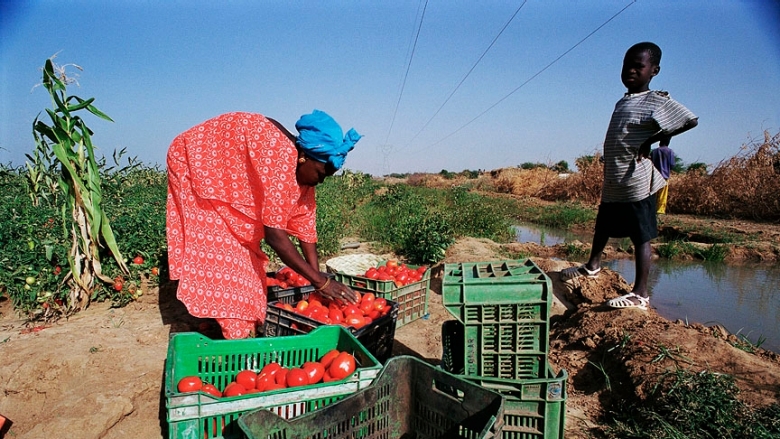Learning, skills and youth employment. Across Africa, governments want to open pathways for young citizens to improve their lives and grow up to raise families free of poverty. There's a lot to do. Low-quality schools don't give students what they need to succeed later on. As a result, many youth are doing work where they don't earn enough money to improve their lives. Policymakers want programs that deliver results when it comes to improving education, skills and productivity for Africa's youth.
It's this demand for results that brought more than 120 high-level government representatives and program managers from countries across the region to Dakar, Senegal in October for the African Impact Evaluation Workshop on education, skills and productivity among youth. The workshop, jointly organized by SIEF, the World Bank's Africa region, and the DIME group in the Development Research Group, gave policymakers the opportunity to exchange ideas with counterparts from countries with similar development challenges and the time to hone program designs and impact evaluations.
"If you don't have an evaluation, then you don't know if you're getting value for money,"
said participant Rosalind Olaomi, deputy director in the Nigerian National Directorate of Employment in Abuja.
The five-day workshop focused on how to incorporate impact evaluations into programs before they are launched, and how to ensure the evaluations will produce evidence of what the program is delivering. Participants reviewed the basics of impact evaluation and the challenges - and rewards - of using it. World Bank staff and external researchers presented evidence generated by evaluations of programs in education, social protection and youth employment and gave real-life examples of some of the obstacles policymakers and researchers face when working together to conduct impact evaluations over the course of the project cycle.
Participants had the opportunity to go deeper into issues related to designing and implementing an evaluation in the small group sessions structured around case studies and in technical sessions led by World Bank staff and external researchers.
Every day, project teams also worked on their specific evaluation project with technical specialists from the World Bank and researchers from J-PAL, Innovations for Poverty Action (IPA), University College London, the University of California, Berkeley and ENSAE (Paris). This allowed the workshop to provide tailored support and the direct application of tools and global knowledge to project and region-specific contexts.
We want to see if it is working and, if it’s not working, we want to know why,” said Josephine Otieno, a monitoring and evaluation officer with the Kenya Private Sector Alliance, which is implementing a government pilot to reach more than 10,000 youth in three cities with training and internships. The project’s goal is to have 50 percent of participants employed six months after the internship ends.
The workshop also served as an opportunity to strengthen links with a range of partner institutions, creating a strong network for knowledge sharing and learning. Partner institutions including DfID, whose funding for SIEF helped make the workshop possible, the International Labour Organization (ILO), the World Health Organization (WHO), the Inter-American Development Bank (IDB), which sent a team from Haiti to learn about impact evaluation, and the African Development Bank (AfDB) participated either as stand-alone teams or as part of World Bank project teams.
When resources are limited, demands are many and governments are pressed to act, it’s not easy to test what works. But the World Bank, working with governments throughout the developing world, wants to ensure that policymakers design programs that generate systematical evidence, and share to the best evidence and the knowledge across programs. Otherwise, it’s not just time and money that is being wasted, but lives.
The workshop was attended by 126 participants from more than 20 countries, among them Bangladesh, Benin, Cameroon, Chad, Congo, Cote d’Ivoire, Ghana, Haiti, Kenya, Liberia, Madagascar, Malawi, Niger, Nigeria, Peru, Democratic Republic of Congo, Senegal, Sierra Leone and Sudan. The team from the World Bank's Africa Region included Deon Filmer, Linda English, Patrick Premand, Stefano Paternostro, Thomas Bossuroy, Nina Rosas Raffo, Peter Materu, Marie-Helene Cloutier, Shwetlena Sabarwal, Dave Evans, Julia Vaillant and Shubha Chakravarty. The DIME team included Arianna Legovini, Owen Ozier, Victor Orozco, Violaine Pierre, Jedediah Fix, Qiao Wang, Edwin Daniels, Robert Garlick, Damien Mededji, Frederic Lafleur Parfaite, and Silvia Velez Caroco. The SIEF team included Joost de Laat, Benedicte de la Briere, Nazmul Chaudhury, Julieta Trias, Jacobus Cilliers and Aliza Marcus. External faculty and moderators included Ted Miguel (UC Berkley); Bruno Crepon (ENSAE Paris); Michelle Perez (Inter-American Development Bank), Conner Brannen and Meghan Mahoney, from The Abdul Latif Jameel Poverty Action Lab (J-PAL), Nicolo Tomaselli (Innovations for Poverty Action), Drew Gardiner (International Labour Organization), and Alex Armand (University College London, Institute for Fiscal Studies). |
